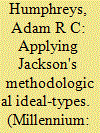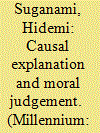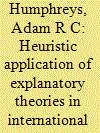| Srl | Item |
| 1 |
ID:
119990


|
|
|
|
|
| Publication |
2013.
|
| Summary/Abstract |
In The Conduct of Inquiry in International Relations, Patrick Jackson situates methodologies in International Relations in relation to their underlying philosophical assumptions. One of his aims is to map International Relations debates in a way that 'capture[s] current controversies' (p. 40). This ambition is overstated: whilst Jackson's typology is useful as a clarificatory tool, (re)classifying existing scholarship in International Relations is more problematic. One problem with Jackson's approach is that he tends to run together the philosophical assumptions which decisively differentiate his methodologies (by stipulating a distinctive warrant for knowledge claims) and the explanatory strategies that are employed to generate such knowledge claims, suggesting that the latter are entailed by the former. In fact, the explanatory strategies which Jackson associates with each methodology reflect conventional practice in International Relations just as much as they reflect philosophical assumptions. This makes it more difficult to identify each methodology at work than Jackson implies. I illustrate this point through a critical analysis of Jackson's controversial reclassification of Waltz as an analyticist, showing that whilst Jackson's typology helps to expose inconsistencies in Waltz's approach, it does not fully support the proposed reclassification. The conventional aspect of methodologies in International Relations also raises questions about the limits of Jackson's 'engaged pluralism'.
|
|
|
|
|
|
|
|
|
|
|
|
|
|
|
|
| 2 |
ID:
105931


|
|
|
|
|
| Publication |
2011.
|
| Summary/Abstract |
By combining arguments about causal explanation in history found in the writings of Veyne and Dray, this article discusses one plausible line of reasoning which suggests that there is a type of causal explanation which historians offer to which their moral judgements are conceptually integral. It assesses the validity of this line of thinking and suggests that the reason why, in some cases, our moral judgements seep through to our causal explanations is not that certain concepts, such as, in particular, passivity and activity of the key actors' acts, used in our causal narratives, necessarily involve moral judgements for their application, but rather that any explanation is an answer to a question and some causal questions turn out to be, or may plausibly be construed as, asking for our moral views. The 'intrusion' of moral judgement into causal explanation is not logically necessary, but may be contextually appropriate in some cases.
|
|
|
|
|
|
|
|
|
|
|
|
|
|
|
|
| 3 |
ID:
105949


|
|
|
|
|
| Publication |
2011.
|
| Summary/Abstract |
Explanatory theorists increasingly insist that their theories are useful even though they cannot be deductively applied. But if so, then how do such theories contribute to our understanding of international relations? I argue that explanatory theories are typically heuristically applied: theorists' accounts of specific empirical episodes are shaped by their theories' thematic content, but are not inferred from putative causal generalizations or covering laws. These accounts therefore gain no weight from their purely rhetorical association with theories' quasi-deductive arguments: they must be judged on the plausibility of their empirical claims. Moreover, the quasi-deductive form in which explanatory theories are typically presented obscures their actual explanatory role, which is to indicate what sort of explanation may be required, to provide conceptual categories, and to suggest an empirical focus. This account of how theoretical explanations are constructed subverts the nomothetic-idiographic distinction that is often used to distinguish International Relations from History.
|
|
|
|
|
|
|
|
|
|
|
|
|
|
|
|